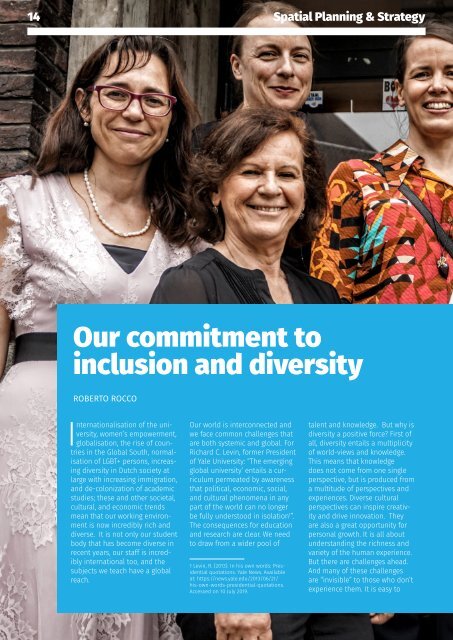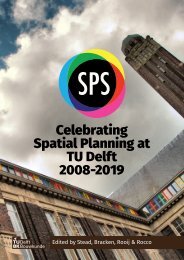*Celebrating Spatial Planning at TU Delft: 2008-2019. Edited by Stead, Bracken, Rooij & Rocco
This is a summary of the achievements of the session Spatial Planning & Strategy of the Department of Urbanism, Faculty of Architecture and the Built Environment, TU Delft, led by Professor Vincent Nadin between 2008 and 2019.
This is a summary of the achievements of the session Spatial Planning & Strategy of the Department of Urbanism, Faculty of Architecture and the Built Environment, TU Delft, led by Professor Vincent Nadin between 2008 and 2019.
Create successful ePaper yourself
Turn your PDF publications into a flip-book with our unique Google optimized e-Paper software.
14 <strong>Sp<strong>at</strong>ial</strong> <strong>Planning</strong> & Str<strong>at</strong>egy<br />
Our commitment to<br />
inclusion and diversity<br />
ROBERTO ROCCO<br />
Intern<strong>at</strong>ionalis<strong>at</strong>ion of the university,<br />
women’s empowerment,<br />
globalis<strong>at</strong>ion, the rise of countries<br />
in the Global South, normalis<strong>at</strong>ion<br />
of LGBT+ persons, increasing<br />
diversity in Dutch society <strong>at</strong><br />
large with increasing immigr<strong>at</strong>ion,<br />
and de-coloniz<strong>at</strong>ion of academic<br />
studies; these and other societal,<br />
cultural, and economic trends<br />
mean th<strong>at</strong> our working environment<br />
is now incredibly rich and<br />
diverse. It is not only our student<br />
body th<strong>at</strong> has become diverse in<br />
recent years, our staff is incredibly<br />
intern<strong>at</strong>ional too, and the<br />
subjects we teach have a global<br />
reach.<br />
Our world is interconnected and<br />
we face common challenges th<strong>at</strong><br />
are both systemic and global. For<br />
Richard C. Levin, former President<br />
of Yale University: “The emerging<br />
global university’ entails a curriculum<br />
perme<strong>at</strong>ed <strong>by</strong> awareness<br />
th<strong>at</strong> political, economic, social,<br />
and cultural phenomena in any<br />
part of the world can no longer<br />
be fully understood in isol<strong>at</strong>ion 1 ”.<br />
The consequences for educ<strong>at</strong>ion<br />
and research are clear. We need<br />
to draw from a wider pool of<br />
1 Levin, R. (2013). In his own words: Presidential<br />
quot<strong>at</strong>ions. Yale News. Available<br />
<strong>at</strong>: https://news.yale.edu/2013/06/21/<br />
his-own-words-presidential-quot<strong>at</strong>ions.<br />
Accessed on 10 July <strong>2019.</strong><br />
talent and knowledge. But why is<br />
diversity a positive force? First of<br />
all, diversity entails a multiplicity<br />
of world-views and knowledge.<br />
This means th<strong>at</strong> knowledge<br />
does not come from one single<br />
perspective, but is produced from<br />
a multitude of perspectives and<br />
experiences. Diverse cultural<br />
perspectives can inspire cre<strong>at</strong>ivity<br />
and drive innov<strong>at</strong>ion. They<br />
are also a gre<strong>at</strong> opportunity for<br />
personal growth. It is all about<br />
understanding the richness and<br />
variety of the human experience.<br />
But there are challenges ahead.<br />
And many of these challenges<br />
are “invisible” to those who don’t<br />
experience them. It is easy to




